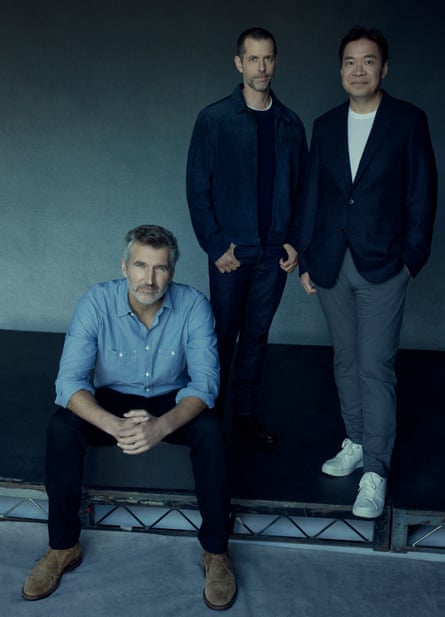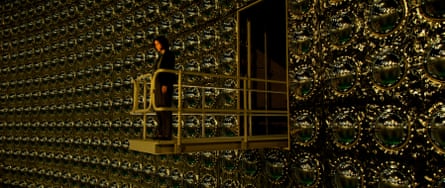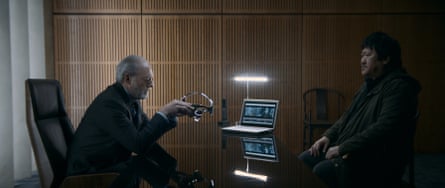‘I really wanted to get away from horses,” says David Benioff. It has been five years since the end of [Game of Thrones](https://www.theguardian.com/tv-and-radio/game-of-thrones), the world-conquering show that put Benioff and his joint showrunner DB Weiss on the iron throne of small-screen entertainment. Anticipation has been high as to what they’d do next – especially after their $200m (£157m) leap from [HBO to Netflix](https://www.theguardian.com/film/2019/oct/29/game-of-thrones-creators-benioff-and-weiss-drop-star-wars-movies-for-netflix) in 2019. The answer turns out to be a complete U-turn: away from high fantasy and into futuristic sci-fi. So it’s goodbye to swords, sex and feudal scheming, hello to interstellar travel and quantum entanglement. They really mean it about the horses. “Horses are dangerous if you don’t know what to do with them. They weigh, like, 1,200lbs, and they run really, really fast,” says Weiss over video call from an unusually rainy Los Angeles. “I think it’s a minor miracle that we escaped eight years in Westeros with no actor being seriously injured,” says Benioff. “It almost happened in the last season. Nikolaj Coster-Waldau \[who plays Jaime Lannister\] fell off a horse, and he was one of our best riders, but there were wet cobblestones and the horse slipped. Luckily, Nik is a good-enough athlete that he was able to jump clear.” It wasn’t just the horses. Nor was it Northern Ireland, where much of the show was made. “I feel nostalgic when I look out of my window and I see a rare case of LA looking the way Belfast did,” says Weiss. But Thrones fans sensed that Benioff and Weiss were tiring of their golden goose during a final season that, for many, brought the saga to a disappointing conclusion. [](https://www.theguardian.com/tv-and-radio/2024/mar/08/goodbye-horses-hello-cosmos-how-the-game-of-thrones-team-went-interstellar-with-3-body-problem-netflix#img-2) Why are the stars flickering on and off? … Jess Hong as Jin Cheng and John Bradley as Jack Rooney in 3 Body Problem. Photograph: Ed Miller/Netflix “We loved the time we spent doing what we did,” says Weiss. “But it was 13 years. You’re living, sometimes literally, in castles day in, day out, operating in one world, within the confines of one subgenre. At a certain point, things start to ossify if you stay in one place for too long. We wanted to shake things up.” They got their wish. Their new show, [3 Body Problem](https://www.theguardian.com/tv-and-radio/2024/jan/12/knives-guns-poison-the-bizarre-catastrophes-that-befell-hit-tv-shows), is adapted from a bestselling science-fiction trilogy by [Liu Cixin](https://www.theguardian.com/books/2016/dec/14/liu-cixin-chinese-sci-fi-universal-the-three-body-problem), formerly a power plant engineer in Shanxi province, now considered “China’s Arthur C Clarke”. Published in 2007, it was the first Asian novel to win the Hugo award and has sold more than 20m copies in its English translation alone (which has a cover quote by Barack Obama, no less). Even by sci-fi standards, the story is staggering in its scope – some portions are set 18m years into the future, in galaxies far, far away. Liu’s story introduces concepts it is almost impossible to fathom, let alone visualise. Such as 11-dimensional supercomputers the size of protons. Or a landscape that’s lit by three suns in chaotic orbit (this is the “three-body problem” of the title). “Our DoP was literally tearing his hair out trying to figure out how to light for three suns,” says Benioff. “It was similar to the original thought with [Game of Thrones](https://www.theguardian.com/tv-and-radio/game-of-thrones), which was: this could maybe be a great series, but how on Earth are we going to get it made? The intimidation factor was perversely appealing for us.” “That’s where all the grey comes from,” says Weiss, pointing to his hair. [](https://www.theguardian.com/tv-and-radio/2024/mar/08/goodbye-horses-hello-cosmos-how-the-game-of-thrones-team-went-interstellar-with-3-body-problem-netflix#img-3) ‘It’s perversely appealing how intimidating it is’ … From left: David Benioff, DB Weiss and Alexander Woo, creators of 3 Body Problem. Photograph: Austin Hargrave/Netflix Benioff continues: “Particularly now, in the wake of ‘peak TV’ – I don’t even know if we’re still in it – but given how many shows have come out in the last decade, trying to distinguish yourself from everything else that’s out there becomes harder and harder.” Part of the initial appeal of watching 3 Body Problem is just figuring out what the hell is going on: scientists around the world are inexplicably taking their own lives; the stars in the night sky mysteriously flicker on and off; a strange metallic headset transports people to an uncannily immersive VR game; and Jonathan Pryce is heading up an apocalyptic cult on an oil tanker. If Benedict Wong’s world-weary detective can’t figure it out, what hope for the rest of us? Without giving too much away, 3 Body Problem is an alien-invasion story. We don’t even see any aliens in this first, eight-part season but we know they’re coming, though we’ve got 400 years to prepare. While the book’s settings and characters are all Chinese, Benioff and Weiss – along with Chinese American producer Alex Woo, best known for HBO’s True Blood – have made liberal changes in terms of locations, genders and ethnicities, refashioning the story around a multicultural group of ex-university friends in the UK, particularly Oxford. “Honestly, we really like living and working over there,” says Benioff. Having made Game of Thrones in the UK, “it was a great chance to get the band back together.” It was also a matter of aesthetics, says Weiss, Oxford’s clashing mix of super high-tech and medieval architecture just fit the story: “No offence to Berkeley or MIT, but none of them really look like Christ Church.” This is potentially perilous ground, considering recent “race-lifting” fiascos such as the Scarlett Johansson-led remake of Japanese anime Ghost in the Shell, or M Night Shyamalan’s 2010 version of Avatar: The Last Airbender, which cast white actors in roles that were originally east Asian and Inuit. This is different, the showrunners argue. For one thing, an authentically Chinese version of Liu’s story already exists: a 30-part series, faithful to the novel, was broadcast on Chinese state television last year. Their series is the _English-language_ adaptation, Benioff stresses: “We’re doing something different; we’ve made the show global.” When they met him over a videocall in 2022, Liu himself understood the necessity of making changes, says Weiss. “He had sort of preempted where we were planning on going before we could even float any of the ideas … in a weird way, it put more pressure on us. I think we’re more worried about letting him down.” Woo adds: “The first thing he said was: ‘I’m a huge fan of Game of Thrones.’” [skip past newsletter promotion](https://www.theguardian.com/tv-and-radio/2024/mar/08/goodbye-horses-hello-cosmos-how-the-game-of-thrones-team-went-interstellar-with-3-body-problem-netflix#EmailSignup-skip-link-18) Sign up to What's On Get the best TV reviews, news and exclusive features in your inbox every Monday **Privacy Notice:** Newsletters may contain info about charities, online ads, and content funded by outside parties. For more information see our [Privacy Policy](https://www.theguardian.com/help/privacy-policy). We use Google reCaptcha to protect our website and the Google [Privacy Policy](https://policies.google.com/privacy) and [Terms of Service](https://policies.google.com/terms) apply. after newsletter promotion [](https://www.theguardian.com/tv-and-radio/2024/mar/08/goodbye-horses-hello-cosmos-how-the-game-of-thrones-team-went-interstellar-with-3-body-problem-netflix#img-4) ‘It’s vast. Like, cosmically vast’ … Vedette Lim as Vera Ye in 3 Body Problem. Photograph: Netflix Even in its new version, 3 Body Problem still contains plenty of Chinese characteristics, which is part of what makes it so refreshing. Ironically, perhaps, the show has more actors of Chinese descent than any mainstream show in recent memory, alongside a few old Thrones faces such as Pryce and Liam “Davos Seaworth” Cunningham. The story begins in 1960s China during the Cultural Revolution – a time when scientists and intellectuals were being persecuted and even executed (and sci-fi was banned). It is still a sensitive subject in China. When Liu’s book was first serialised, in 2006, the chapters set during the Cultural Revolution were published later in the story to avoid attracting official attention. “When we auditioned actresses from China and asked them what they knew about the Cultural Revolution, almost all of them said: ‘We really didn’t learn about this in school,’” says Woo. On a broader level, let’s face it, mainstream sci-fi is still dominated by old stories written by white guys. Dune: Part Two, currently cleaning up at the box office, is based on a story from 1965. Likewise Apple TV+’s big-budget Foundation series (adapted from a 1951 Isaac Asimov story), or long-running, endlessly rebooted franchises like Star Wars, Star Trek, Alien and Doctor Who. With its new concepts and perspectives, Liu’s saga is a breath of fresh air. Is there anything inherently Chinese about it? Some have noted that in western sci-fi, invariably, the humans conquer the galaxy or repel the aliens but in Liu’s story we humans are under threat from a civilisation that is more powerful and technologically advanced – comparable, perhaps, to China’s position during Liu’s childhood: a nation overshadowed by the more technologically advanced US. It may also reflect China’s newfound embrace of technology, says Woo: “There is, culturally, a sense that that technological achievement, technological superiority, is paramount … the more you advance technologically, the more you advance as a society.” Perhaps the torch has been passed; sci-fi literature is now booming in China. In a 2014 [interview](https://www.nytimes.com/2014/11/11/books/liu-cixins-the-three-body-problem-is-published-in-us.html) with the New York Times, Liu said: “China is on the path of rapid modernisation and progress, kind of like the US during the golden age of science fiction … The future in the people’s eyes is full of attractions, temptations and hope. But at the same time, it is also full of threats and challenges. That makes for very fertile soil.” In the context of China’s communist rule, there could even be a political debate going on here. Liu’s story has running through it “a strong element of exploring the differences between a fundamentally collectivist attitude towards your society and a fundamentally individualist attitude,” says Benioff. “It’s a very, very interesting, nuanced vision.” [](https://www.theguardian.com/tv-and-radio/2024/mar/08/goodbye-horses-hello-cosmos-how-the-game-of-thrones-team-went-interstellar-with-3-body-problem-netflix#img-5) If Benedict Wong’s world-weary detective can’t figure it out, what hope for the rest of us? … Wong as Da Shi with Liam Cunningham as Wade in 3 Body Problem. Photograph: Netflix Despite the threat of alien colonisation, 3 Body Problem is not really a dystopian story, say the creators. If anything, it’s the _aliens_ who live in the dystopia; to them, our planet is paradise. It could even be seen as optimistic, in that it imagines humanity coming together in the face of a global existential crisis. “If Covid taught us anything, it’s that the world, at least as presently constructed, does _not_ come together in a crisis,” says Benioff. “It’s hard to imagine what _would_ bring us together. Maybe it would take an alien invasion.” Whether or not these messages resonate with humanity on a Game of Thrones scale, we’ll find out soon enough. Could 3 Body Problem do for sci-fi what Thrones did for fantasy? Benioff, Weiss and Woo have no idea, they profess. The feeling right now brings back memories of just before Thrones premiered, says Benioff, with a then-unknown cast heavy with northern-accented Brits: “I was terrified, watching the show hundreds of times and thinking: ‘Is anyone in the United States going to understand these accents?’” When that show started, they had lower expectations, says Weiss: “Initially we thought, this will be a hit with a certain kind of person. And most other kinds of people may not make it past episode five.” Game of Thrones was not a runaway success from day one, but in the pre-streaming era, it had time to find an audience. The fear is that 3 Body Problem may not have that degree of latitude – which it very much needs: season one is “relatively contained compared to where it goes from here,” says Weiss. “It gets vast. Like, cosmically vast. The hope is to get enough people interested to take that trip to the farthest reaches of everything.” _3 Body Problem is on Netflix on_ _21 March__._